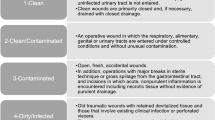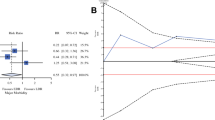Abstract
Background and objectives
Several recent studies identified that postoperative infectious complications contribute to recurrence and poor outcome in patients with gastric cancer. This study was designed to investigate the prognostic impact of postoperative pneumonia, and to identify the putative risk factors for its occurrence.
Methods
We retrospectively analyzed 1,415 consecutive patients who underwent curative gastrectomy for gastric cancer between 1997 and 2013.
Results
A total of 31 (2.2 %) patients developed postoperative pneumonia (Clavien–Dindo classification ≥II). Patients with postoperative pneumonia showed a significantly poorer prognosis than patients without (P < 0.001). Concerning the occurrence of postoperative pneumonia, univariate and multivariate analyses identified older age (≥65 years; P = 0.010; odds ratio [OR] 3.59), lower nutritious status (albumin <3 0; P = 0.029; OR 4.51), advanced stage (pStage ≥II; P = 0.045; OR 2.35), concurrent hypertension (P = 0.042; OR 2.21) and total gastrectomy (P = 0.026; OR 2.42) as independent risk factors.
Conclusions
Postoperative pneumonia was shown to be associated with long-term poor outcome in patients with gastric cancer. Care should be taken for patients with clinical factors such as older age, lower nutritional status, advanced stage, concurrent hypertension, and total gastrectomy.

Similar content being viewed by others
References
Ferlay J, Shin HR, Bray F et al (2008) Estimates of worldwide burden of cancer in 2008: GLOBOCAN 2008. Int J Cancer 127:2893–2917
The Foundation for Promotion of Cancer Research (FPCR) (2013) Cancer statistics in Japan
Zhang Q, Wang F, Chen ZY et al (2015) Comparison of the diagnostic efficacy of white light endoscopy and magnifying endoscopy with narrow band imaging for early gastric cancer: a meta-analysis. Gastric Cancer 19(2):543–552
Kitano S, Shiraishi N, Uyama I, Japanese Laparoscopic Surgery Study Group et al (2007) A multicenter study on oncologic outcome of laparoscopic gastrectomy for early cancer in Japan. Ann Surg 245(1):68–72
Komatsu S, Ichikawa D, Kashimoto K et al (2013) Risk factors to predict severe postoperative pancreatic fistula following gastrectomy for gastric cancer. World J Gastroenterol 19(46):8696–8702
Bang YJ, Van Cutsem E, Feyereislova A et al (2010) Trastuzumab in combination with chemotherapy versus chemotherapy alone for treatment of HER2-positive advanced gastric or gastro-oesophageal junction cancer (ToGA): a phase 3, open-label, randomised controlled trial. Lancet 376(9742):687–697
Lawrence VA, Hilsenbeck SG, Mulrow CD et al (1995) Incidence and hospital stay for cardiac and pulmonary complications after abdominal surgery. J Gen Intern Med 10:671–678
Thompson DA, Makary MA, Dorman T et al (2006) Clinical and economic outcomes of hospital acquired pneumonia in intra-abdominal surgery patients. Ann Surg 243(4):547–552
Hayashi T, Yoshikawa T, Aoyama T et al (2015) Impact of infectious complications on gastric cancer recurrence. Gastric Cancer 18(2):368–374
Tokunaga M, Tanizawa Y, Bando E et al (2013) Poor survival rate in patients with postoperative intra-abdominal infectious complications following curative gastrectomy for gastric cancer. Ann Surg Oncol 20(5):1575–1583
Ohtsuka T, Kitajima Y, Takahashi T et al (2009) Infectious complications after gastric cancer surgery accelerate a rapid hepatic recurrence. Hepatogastroenterology 56(94–95):1277–1280
Fisher BW, Majumdar SR, McAlister FA (2002) Predicting pulmonary complications after nonthoracic surgery: a systematic review of blinded studies. Am J Med 112(3):219–225
McAlister FA, Bertsch K, Man J et al (2005) Incidence of and risk factors for pulmonary complications after nonthoracic surgery. Am J Respir Crit Care Med 171(5):514–517
Inokuchi M, Kojima K, Kato K et al (2014) Risk factors for post-operative pulmonary complications after gastrectomy for gastric cancer. Surg Infect (Larchmt) 15(3):314–321
Japanese Gastric Cancer Association (2011) Japanese classification of gastric carcinoma: 3rd English edition. Gastric Cancer 14:101–112
Nakajima T (2002) Gastric cancer treatment guidelines in Japan. Gastric Cancer 5:1–5
Kodera Y, Sasako M, Yamamoto S, Gastric Cancer Surgery Study Group of Japan Clinical Oncology Group et al (2005) Identification of risk factors for the development of complications following extended and superextended lymphadenectomies for gastric cancer. Br J Surg 92(9):1103–1109
Cleva R, Assumpção MS, Sasaya F et al (2014) Correlation between intra-abdominal pressure and pulmonary volumes after superior and inferior abdominal surgery. Clinics (Sao Paulo) 69(7):483–486
Pellegrini CA, DeMeester TR, Johnson LF et al (1979) Gastroesophageal reflux and pulmonary aspiration: incidence, functional abnormality, and results of surgical therapy. Surgery 86(1):110–119
Marumo K, Homma S (2005) Role of gastro-esophageal reflux (GER) and swallowing latency in aspiration pulmonary diseases. Nihon Kokyuki Gakkai Zasshi 43(6):333–339 (in Japanese)
Marumo K, Homma S, Fukuchi Y (1995) Postgastrectomy aspiration pneumonia. Chest 107(2):453–456
Takeshita H, Ichikawa D, Komatsu S et al (2013) Surgical outcomes of gastrectomy for elderly patients with gastric cancer. World J Surg 37(12):2891–2898
Kawaguchi T, Komatsu S, Ichikawa D et al (2015) Clinical significance of chemotherapy for geriatric patients with advanced or recurrent gastric cancer. Mol Clin Oncol 3(1):83–88
Author information
Authors and Affiliations
Corresponding author
Ethics declarations
Conflict of interest
All authors have no conflict of interests to disclose.
Additional information
J. Kiuchi and S. Komatsu equally contributed to this work.
About this article
Cite this article
Kiuchi, J., Komatsu, S., Ichikawa, D. et al. Putative risk factors for postoperative pneumonia which affects poor prognosis in patients with gastric cancer. Int J Clin Oncol 21, 920–926 (2016). https://doi.org/10.1007/s10147-016-0987-8
Received:
Accepted:
Published:
Issue Date:
DOI: https://doi.org/10.1007/s10147-016-0987-8




